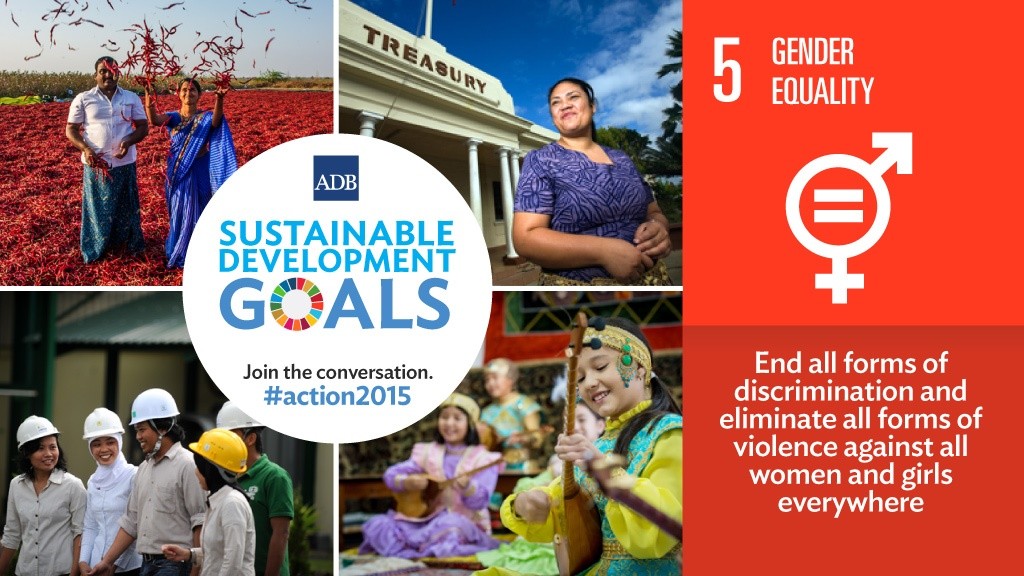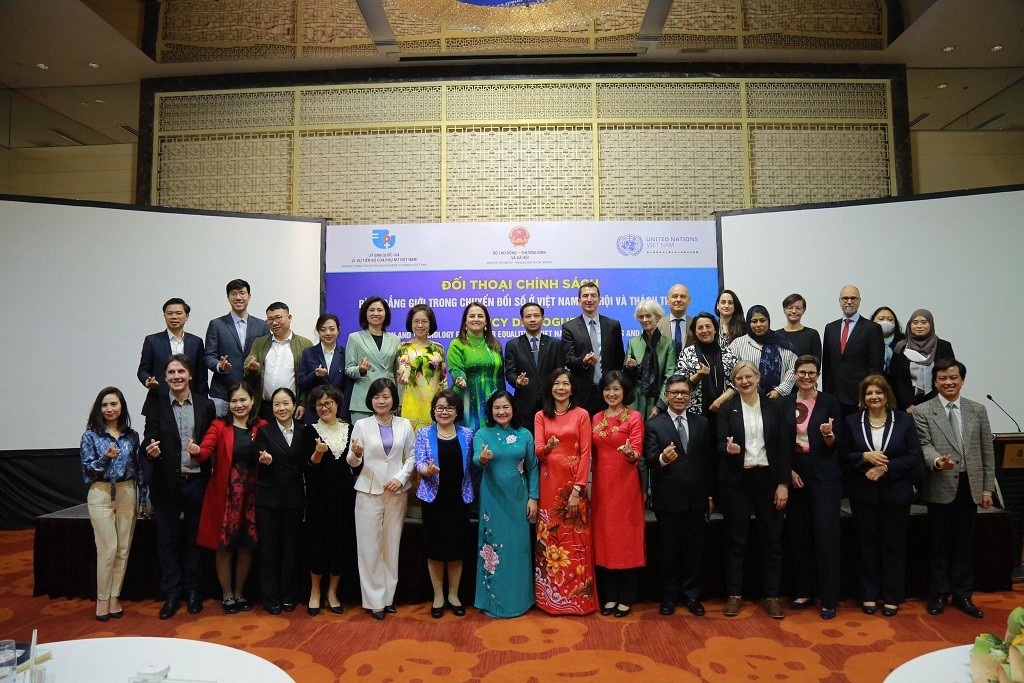
Gender equality: foundation for sustainable development goals
Latest
That is a disturbing reality in the implementation process of the 2030 Agenda for Sustainable Development that the United Nations (UN) raised in the Report “Progress on the Sustainable Development Goals: The Gender Snapshot 2023” in last September.
The Report assesses women’s progress in achieving the UN’s 17 sustainable development goals by 2030, concerning issues from poverty reduction and education to climate change and human rights. Thanks to it, the gender gap and the global commitment to equality for women have become increasingly obvious.
 |
| In today’s diverse and unpredictable world, the path to achieve the gender equality goal is more difficult than ever. (Photo: Getty Images) |
Difficult journey
Half the journey to 2030 has passed, UN members have been making efforts to achieve 17 sustainable development goals (SDGs), including ensuring gender equality. However, in today’s diverse and unpredictable world, the path to achieve the gender equality goal is more difficult than ever.
Regarding the main goal of poverty reduction, the Report affirms that 1 in 10 will live with an income of below 2.15 USD per day. If this trend continues, 8% of the world’s female population (mostly in sub-Saharan Africa) will be living in extreme poverty by 2030. In addition, although the access to education for girls and boys in general is increasing, the Report emphasizes that millions of girls have never attended school or finished their education. With this reality, 110 million students are estimated to not able to go to school by 2030. Regarding the sustainable employment goal, the Report notes that only two-thirds of women aged from 25 to 54 years old join the labor force in 2022 compared to 90.6% of men.
In particular, escalating conflicts make the world face a “shocking” number of 614 million women and girls living in conflict-affected contexts in 2022, 50% higher than 2017. Besides, funding for programs promoting gender equality and empowering women is “inadequately distributed, unplanned and inconsistent across countries.”
The Report also points out the sad situation that the world will need to invest an additional 360 billion USD per year to achieve gender equality and empower women by 2030. Therefore, the gender equality goal is becoming more distant.
Dealing with such a “gloomy” panorama, Assistant Secretary-General Maria-Francesca Spatolisano affirmed that gender equality is becoming an “increasingly distant goal”. She pointed out obstacles for women and girls living in countries affected by conflicts, the climate change impacts, and “opposition to gender equality and lack of investment”. The UN Economic and Social Council (ECOSOC) warned that continuing to not prioritize achieving gender equality will cause the SDGs can only be stored.
 |
| Delegates attending a policy dialogue on the topic “Gender equality in digital transformation in Viet Nam: Opportunities and challenges” in Hanoi in March 2023. (Photo: UN Women) |
Vietnam's great progress
As a UN member country, Vietnam strongly committed to the SDGs. It must be admitted that in the current international context, Vietnam faces many difficulties in achieving the SDGs, including promoting gender equality. However, with high determination and unchanging consensus, Vietnam gradually eliminating obstacles, proactively implementing from policy to practice, and accelerating towards the finish line. Currently, Vietnam is one of the earliest countries to complete the gender equality and women empowerment goals and is making efforts to implement the 2030 Agenda for Sustainable Development.
Regarding policies, Vietnam has issued and implemented policies and solutions to achieve gender equality goals in each particular field, such as National strategies for the Advancement of Women to the year 2000, National Strategy on Gender Equality for the 2011-2020 period, projects and programs on preventing and responding to gender-based violence, and the recent National Strategy on Gender Equality for the 2021-2030 period.
Apart from carrying out domestic solutions, Vietnam also always strives to cooperate internationally in gender equality promotion. As ASEAN Chair in 2020, UN Security Council non-permanent member for the 2020-2021 tenure, Chairman of the 41st ASEAN Inter-Parliamentary General Assembly, member of the UN Human Rights Council for the 2023-2025 period, Vietnam aims to synchronously and effectively implement important initiatives in strengthening cooperation to promote gender equality and women empowerment.
The current scenery of gender equality in Vietnam has clearly changed in a positive way. Regarding economics, women are increasingly asserting their positions and have opportunities for higher income, thereby contributing significantly to help the country maintain high economic growth over the past decade.
In terms of politics, according to the Report, Vietnam is a bright spot in implementing the millennium goals on gender equality. Through Party Congresses at all levels and the 13th National Party Congress, women cadres participating in executive committee at all levels increased in both quantity and quality. Currently, the national average rate of female members of the Provincial Party Executive Committee accounts for 16%, with 61 out of 63 provinces and cities having women cadres in the Standing Committee. The National Assembly’s proportion of women deputies in the 15th tenure reached 30.26%, an increase of 3.54% compared to the previous tenure. The results of the election of People’s Councils at all levels for the 2021-2026 tenure also recorded an increase in women delegates, in which the percentage of women deputies reached 29%, compared to 26.5% of the previous tenure.
Regarding education, the enrollment rates of boys and girls in primary and secondary schools are high and balanced. In terms of health care, people’s life expectancy is increasing and access to health care services is increasingly improving. This result demonstrates efforts to implement gender equality in Vietnam and is a solid foundation for all levels and sectors to further maintain and promote the implementation of national gender equality goals in the upcoming time.
However, according to the Voluntary National Review 2023 on the Implementation of the Sustainable Development Goals, certain limitations in promoting gender equality still exist, such as: The gender imbalance at birth is still extremely high and tends to increase with the gender ratio at birth in 2022 is 111.5 boys/100 girl born. The rate of child marriage and early childbearing is still high among ethnic minority women and violence against women and children still exists. Although the issues have improved, women are still in charge of unpaid household chores, meanwhile the limited infrastructure for caring for children, the elderly, the sick and disabled has made certain impacts on women’s ability to join the labor market. Besides, data to monitor and review the gender equality implementation remains limited.
Vietnam has made steady advances in promoting gender equality but there is still a lot of work to achieve the 17 SDGs, each of which integrates gender equality elements. As a responsible member of the UN, Vietnam will not be frustrated by current boundaries, joining forces with the international community so that no one is left behind.
| In September 2015, the UN adopted the 2023 Agenda for Sustainable Development with the aim of ending poverty, protecting the Earth, and ensuring prosperity for all. The 17 specific goals by 2030 is the first set of criteria being recognized globally towards a better world. |













